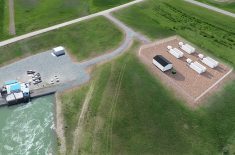Few people attend recent consultation session, but those who do favour an inquiry into renewable energy expansion
Renewable energy development is a hot topic in southern Alberta, but an initial engagement session hosted by the Alberta Utilities Commission on the future of the sector attracted only lukewarm attendance during a recent stop in Medicine Hat.
AUC has started an inquiry into renewable energy development at the province’s request, after the provincial government announced in August a pause on building new solar and wind farms.
As the first part of the inquiry, three sessions were held in Red Deer, Medicine Hat and Pincher Creek Nov. 2-8 to provide information to residents.
Read Also

Environmental farm group has Ottawa’s attention
In 2021, Farmers for Climate Solutions published a report on how Canada should reduce emissions from agriculture. Not long after, the federal government implemented most of the recommendations in the report.
The attendance at the Medicine Hat session was limited to a few dozen people, but the appetite for an inquiry into renewable development and a pause on projects was large.
Carol Krauss, who farms and ranches east and south of Medicine Hat, said she’s not against green energy but the dozens of wind turbines that have sprouted up in her area will not save the environment.
The tons of concrete and rebar used to create the base of the towers and the unsightliness of the turbines are a concern, she said.
As for solar projects, “there are reports they sterilize the ground,” said Krauss.
“There are a lot of buildings everywhere that could have solar panels and some of them can be made to look like trees or put on a rooftop. Why are they putting these monster (projects) up here,” said Krauss.
Wind projects have proliferated around Medicine Hat during the last decade, from three turbines the city owns within municipal boundaries to more than 100 in Cypress and 40-Mile counties.
“Enough is enough,” said Krauss. “There are other ways to be green. I think there are many things people can do as individuals to lessen their footprint and these turbines are using a lot of rare minerals. So, we’re digging up the ground and cutting up forests for what? We’re supposed to be protecting the Earth.”
Long-time local naturalist Rob Gardner said he supports the pause on development but believes there are ways renewable projects can move forward and be less damaging to the ecosystem.
Issues such as the number of bats killed during migrations is a concern. While he highlighted that turbines rarely kill bats when the animals aren’t on the move, there are options to reduce mortality when they are.
“The turbines could be turned off just for the evening hours and just for the two weeks in the spring and fall that the bats are migrating,” said Gardner.
The inquiry is also exploring the possibility of using crown lands for renewable energy development, which has been off the table until now.
“That’s a bad idea for a number of reasons,” said Gardner. “The native grasslands are under real threat. They are greatly reduced already. Many of Canada’s endangered species used to call the grasslands home so we don’t need more industrial development on it.”
Sylvia Hollstein, whose family farms near the Cypress Hills, said the pause will help all stakeholders get a handle on the explosive growth of renewable projects.
Like Krauss, Hollstein questioned why more renewable projects aren’t set up in urban areas where established transmission infrastructure can be used.
She’d like to see more respect given to landowners’ perspectives. She said they should be considered experts during the regulatory process if they’ve farmed or ranched the area for a reasonable amount of time.
“Because it seems the AUC only really listens to experts,” she said.
During Premier Danielle Smith’s address to the Rural Municipalities Association’s fall convention on Nov. 9, she reiterated her government’s position on renewable energy development.
“Alberta knows from experience how important it is to get things right,” she said. “That’s why we are taking the time to clarify the rules and resolve uncertainties.”
The AUC has a comment submission page on its website and is accepting written submissions. The deadline is Nov. 22.
The deadline for the AUC report to government is March 29, 2024.
















